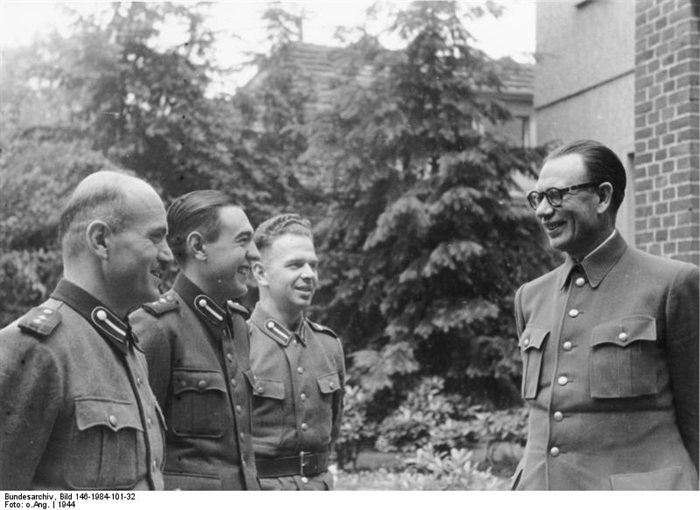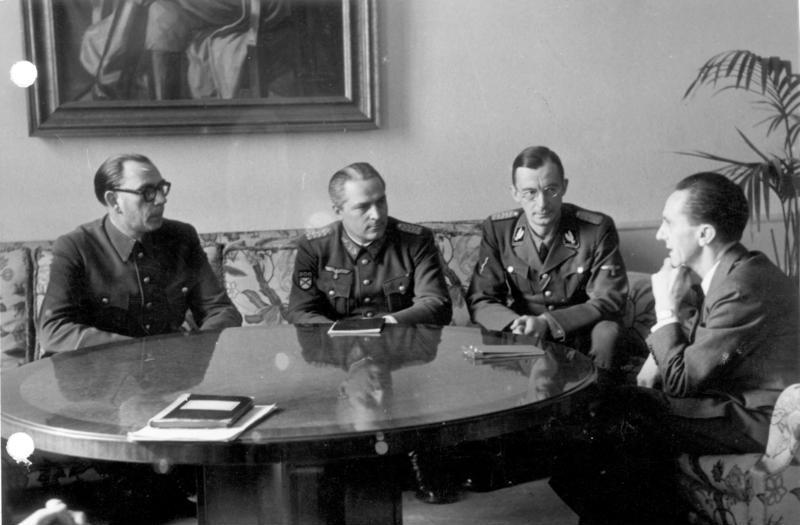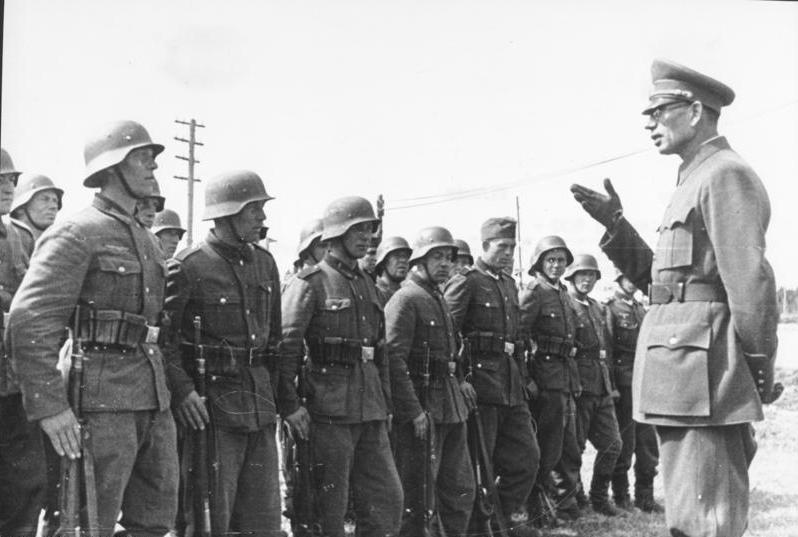<Back to Index>
- Microbiologist Sergei Nikolaievich Winogradsky, 1856
- Illustrator Charles Dana Gibson, 1867
- Lieutenant General of the Soviet Army Andrey Andreyevich Vlasov, 1900
PAGE SPONSOR
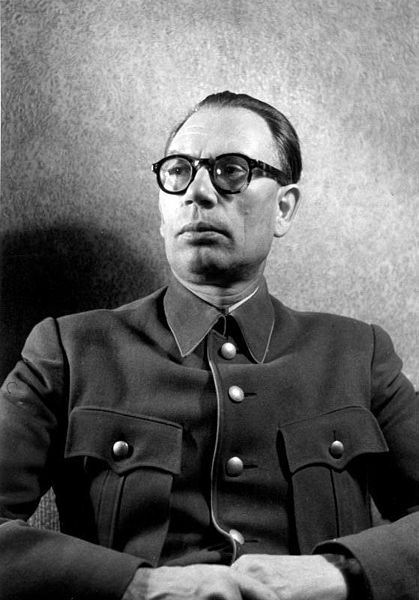
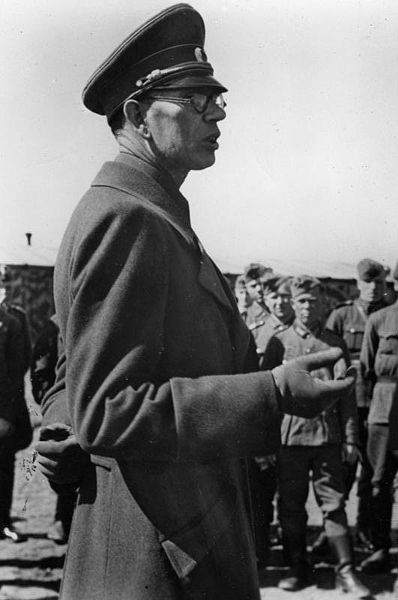
Andrey Andreyevich Vlasov or Wlassow (Russian: Андрéй Андрéевич Влáсов, September 14 [O.S. September 1] 1900 — August 2, 1946) was a Russian former Red Army general who collaborated with Nazi Germany during World War II.
Born in Lomakino, Nizhny Novgorod Oblast, Russian Empire, Vlasov was originally a student at a Russian Orthodox seminary. He quit the study of divinity after the Russian Revolution, briefly studying agricultural sciences instead, and in 1919 joined the Red Army fighting in the southern theatre in Ukraine, the Caucasus, and the Crimea. He distinguished himself as an officer and gradually rose through the ranks of the Red Army.
Vlasov joined the Communist Party in 1930. Sent to China, he acted as a military adviser to Chiang Kai-shek from 1938 to November 1939. Upon his return, Vlasov served in several assignments before being given command of the 99th Rifle Division. After just nine months under Vlasov's leadership, after an inspection by Semyon Timoshenko, the division was recognized as one of the best divisions in the Army in 1940. Timoshenko presented Vlasov with an inscribed gold watch, as he 'found the 99th the best of all. The historian John Erickson says of Vlasov at this point that [he] 'was an up and coming man. In 1940, Vlasov was promoted to major general, and on June 22, 1941, when the Germans and their allies invaded the Soviet Union, Vlasov was commanding 4th Mechanized Corps.
Shortly after the invasion began, Vlasov's corps retook Przemyśl, holding it for six days. As a lieutenant general, he commanded the 37th Army near Kiev and escaped encirclement. He then played an important role in the defense of Moscow, as his 20th Army counterattacked and retook Solnechnogorsk. Vlasov's picture was printed (along with those of other Soviet generals) in the newspaper Pravda as that of one of the "defenders of Moscow". Described by some historians as "charismatic", Vlasov was decorated on January 24, 1942, with the Order of the Red Banner for his efforts in the defence of Moscow. After this success, Vlasov was put in command of the 2nd Shock Army of the Volkhov Front and ordered to lead the attempt to lift the Siege of Leningrad -- the Lyuban - Chudovo Offensive Operation of January – April 1942. Other forces (the Volkhov Front's 4th, 52nd, and 59th Armies, 13th Cavalry Corps, and 4th and 6th Guards Rifle Corps, as well as the 54th Army of the Leningrad Front) failed to exploit Vlasov's advances and his army was left stranded in German held territory. The 2nd Shock Army was surrounded and, in June 1942, destroyed.
After Vlasov's army was surrounded, he himself was offered an escape by aeroplane. The general refused and hid in German occupied territory; ten days later, on July 12, 1942, a local farmer betrayed him to the Germans. Vlasov's opponent and captor, German general Georg Lindemann, interrogated him about the surrounding of his army and details of battles, then had Vlasov imprisoned in occupied Vinnytsia.
Vlasov claimed that during his ten days in hiding he affirmed his anti - bolshevism, believing Stalin was the greatest enemy of the Russian people, and there is evidence that suggests Vlasov may have changed sides in a bid to give his countrymen a better life than the one they had under Stalin. His critics, including Marshall Kirill Meretskov (who had endorsed Vlasov's promotion to executive officer of the Volkhov front) and most Soviet historians, argued that Vlasov adopted a pro-Nazi German stance in prison out of opportunism, careerism, and survival, fearing Stalinist retribution for losing his last battle and his army. Vlasov would have been executed by Stalin for his defeat.
While in prison, Vlasov met Captain Wilfried Strik-Strikfeldt, a German Balt who was attempting to foster a Russian Liberation Movement. Strik - Strikfeldt had circulated memos to this effect in the Wehrmacht. Strik - Strikfeldt, who had been a participant in the White movement during the Russian civil war, persuaded Vlasov to become involved in aiding the German advance against the rule of Stalin and bolshevism. With Lieutenant Colonel Vladimir Boyarsky, Vlasov wrote a memo shortly after his capture to the German military leaders suggesting cooperation between anti-Stalinist Russians and the German Army.
Vlasov was taken to Berlin under the protection of the Wehrmacht's propaganda department. There he, together with other Soviet officers, began drafting plans for the creation of a Russian provisional government and the recruitment of a Russian army of liberation under Russian command.
Vlasov founded the Russian Liberation Committee, in hopes of creating the Russian Liberation Army — known as ROA (from Russkaya Osvoboditel'naya Armiya). Together with some other captured Soviet generals, officers and soldiers, the army's goal was to overthrow Stalinism and create an independent Russian state. Vlasov offered a democratic system of government. Many Russian POWs as well as soldiers who received Vlasov propaganda leaflets were interested in becoming a part of this army.
In the spring of 1943, Vlasov wrote an anti-Bolshevik leaflet known as the "Smolensk Proclamation", which was dropped from aircraft by the millions on Soviet forces and Soviet controlled soil.
Even
though no Russian Liberation Army yet existed, the Nazi propaganda
department issued Russian Liberation Army patches to Russian volunteers
and tried to use Vlasov's name in order to encourage defections — a
strategy they found effective.
Several hundred thousand former Soviet citizens served in the German
army wearing this patch, but never under Vlasov's own command. Adolf Hitler was
very wary of Vlasov and his intentions. On April 3, 1943, Hitler made
clear in a speech to his high command that such an army would never be
created, then issued directives to dismantle any such efforts and to
sequester all of Vlasov's supporters in the German army. He worried
that Vlasov might succeed in overthrowing Stalin, which would halt
Hitler's dreams of expanding Greater Germany to the Urals.
Hitler began taking measures against Eastern Volunteer units,
especially Russian ones, arranging for their transfer to the west. Vlasov was permitted to make several trips to Nazi occupied Russia: most notably, to Pskov,
where Russian pro-German volunteers paraded. The populace's reception
of Vlasov was mixed. While in Pskov, Vlasov dealt himself a nearly
fatal political blow by referring to the Germans as mere "guests"
during a speech, which Hitler found belittling. Vlasov was even put
under house arrest and threatened with being handed over to the Gestapo.
Despondent about his mission, Vlasov threatened to resign and return to
the POW camp, but was dissuaded at the last minute by his confidants. According to Shalamov, Vlasov emissaries lectured to the Russian prisoners of war,
explaining to them that their government had declared them all
traitors, and that escaping was pointless. As Vlasov proclaimed, even
if the Soviets succeeded, Joseph Stalin would send them to Siberia. Only in September 1944 did Germany — at the urging of Heinrich Himmler, initially a virulent opponent of Vlasov — finally permitted Vlasov to raise his Russian Liberation Army. Vlasov formed and chaired the Committee for the Liberation of the Peoples of Russia, proclaimed by the Prague Manifesto on the 14th of November, 1944. Vlasov also hoped to create a Pan-Slavic liberation congress, but Nazi political officials, generally prejudiced against the Slavs, would not permit it. Vlasov's only combat against the Red Army took place on February 11, 1945, on the river Oder.
After three days of battle against overwhelming forces, the First
Division of the ROA was forced to retreat and marched southward to Prague, in German controlled Bohemia. On
May 6, 1945, Vlasov received a request from the commander of the first
ROA division, General Sergei Bunyachenko, for permission to turn his
weapons against the Nazi SS forces and aid Czech resistance fighters in the Prague uprising.
Vlasov at first disapproved, then reluctantly allowed Bunyachenko to
proceed. Some historians maintain it was the bitterness of the ROA
against the Germans which caused them to switch sides once again, while
other historians believe the sole purpose of this action was to win
favor from the western Allies and possibly even the Soviet side, in the
light of the nearly completed military annihilation of the German Reich. Two days later, the first division was forced to leave Prague as communist Czech
partisans began arresting ROA soldiers in order to hand them over to
the Soviets for execution. At this point Vlasov was offered an escape,
through changing into civilian clothes and flying to neutral Spain, but he refused to leave his men. Vlasov
and the rest of his forces, trying to evade the overpowering Red Army
and wishing to preserve their ranks for a future war of liberation,
attempted to head west to surrender to the Allies in the closing days
of the war in Europe. On May 10, 1945, Vlasov and his men reached
western Allied forces and surrendered to them. Vlasov was taken into American captivity and held in a city in Tyrol.
He and his generals continued talks with the British and the Americans,
explaining the principles of their liberation movement and trying to
persuade the western Allies to grant asylum to its participants. The
Allied commanders were divided on the issue; some were sympathetic but
afraid of angering the Soviet Union and of disobeying their western
Allied political leaders, who were still in alliance with Stalin. On May 12, 1945, returning from talks with Captain Richard Donahue,
an American Armor Company Commander from the 37th Tank Battalion,
Vlasov's car was surrounded by Soviet troops. Vlasov's American escort
did not resist as Vlasov was arrested. Vlasov, along with many of his anti-communist Russian and other men, was forcibly repatriated to the Soviet Union. Soviet authorities sent Vlasov to Moscow, where over the course of a year he was held in the Lubyanka prison. A summary trial held in the summer of 1946 and presided over by Viktor Abakumov sentenced
him and eleven other senior officers from his army to death for
treason. The twelve men were hanged on August 1, 1946. These were among
the last death sentences in the Soviet Union carried out by hanging (later a group of Cossack leaders allied with the Germans, including Pyotr Krasnov, Andrei Shkuro, and Helmuth von Pannwitz, suffered the same fate).
A
memorial dedicated to General Vlasov and the participants in the
Russian Liberation Movement was erected at the Novo Deveevo Russian
Orthodox convent and cemetery in Nanuet, New York, USA. Twice annually, on the anniversary of Vlasov's execution and on the Sunday following Orthodox Easter, a memorial service is held for Vlasov and the combatants of the Russian Liberation Army.
In 2001, a Russian Federation based social organization, "For Faith and Fatherland", applied to the Russian Federation's military prosecutor for a review of Vlasov's case, saying
that "Vlasov was a patriot who spent much time re-evaluating his
service in the Red Army and the essence of Stalin's regime before
agreeing to collaborate with the Germans". The
military prosecutor concluded that the law of rehabilitation of victims
of political repressions did not apply to Vlasov and refused to ever
consider the case again personally. However, Vlasov's Article 58 conviction for anti-Soviet agitation and propaganda was vacated.
